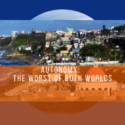Third in a three-part series on “autonomous commonwealth” as a failed territorial regime in Puerto Rico
By Howard Hills
The statehood and independence movements in Puerto Rico know the U.S. Supreme Court’s decision in Balzac was an indefinite sentence, a life sentence, to a life without equal human rights, dignity and freedom.
The “autonomists” advocate what amounts to a form of reverse colonialism under which dependence perversely is valued as a social norm.
The best of both worlds?
The false premise of “commonwealth” is that special privileges like tax breaks that don’t change economic conditions, international sports teams and “cultural nationhood” compensate for the lack of equal rights and opportunities that statehood would have brought.
The ideological rationalization for autonomy with dependency and denial of equality under statehood or nationhood was that “autonomous commonwealth” would enable Puerto Rico to be “like a state” in some ways and “like a nation” in other ways. The so called “best of both worlds.”
The autonomists also touted the idea of a local veto power over federal law as a substitute for equal representation in Congress and the Electoral College. That was given the fictitious name “mutual consent” as an alternative to an equal right to “consent of the governed” as it exists under the U.S. Constitution for citizens in the states.
In unvarnished but accurate terms, “autonomy” with “mutual consent” is a hoax in which the colonized population would accept being denied equal freedom and full rights of citizenship in exchange for entitlements for federal and local welfare.
In this warped ideology, a culture of dependence was conceived to be “revenge for colonialism.” Instead of ending colonialism through statehood or nationhood, the autonomists promised the people “sustainable dependence” on federal subsidies of local government and business, federal programs and services, as well as federal welfare benefits.
After seven decades delaying a real choice between statehood or nationhood, the “autonomous commonwealth hoax” was exposed for what it really means. The failure of the “commonwealth” regime of territorial government has now become undeniable.
It is clear that instead of a “best of both worlds” status “like a state” and also “like a nation” as promised, “commonwealth” is the worst of both words, neither fully equal as a state or independent as a nation.
21st century “autonomy”
In 2012 statehood finally won majority approval in a future political status vote. A majority voted to end the current status.
In 2015, the “commonwealth” regime of territorial government that has been controlled off and on by the “autonomist” party since 1952 experienced fiscal collapse. As leaders of the growing statehood movement had predicted since 1952, the “commonwealth” model of “autonomy” imploded due to the culture of dependence that had expanded beyond economically sustainable limits.
Then in 2016, the U.S. Supreme Court finally nullified the legal myths fabricated by the autonomist “commonwealth” party. In the case of Puerto Rico v. Sanchez Valle, the court rejected claims Puerto Rico had become sovereign in its own name and right, with powers of “mutual consent” over federal law and policy, rather than “consent of the governed” through voting representation in Congress.
To make matters worse in 2017, the island territory was devastated physically, socially and economically by two catastrophic hurricanes. Because it is not a state with equal representation in Congress, the citizens of Puerto Rico and their island were not as prepared for or able to recover from those natural disaster as well as citizens in the states.
Earlier in 2017 a still more conclusive vote than the 2012 plebiscite had occurred, in which statehood was approved by 97% vote of those who turned out, despite a boycott by those who knew that the anti-statehood factions would lose.
Given these historical realities, the 2017 position of the U.S. Department of Justice that the current status should be on the ballot as a permanent option to “resolve the status” of the territory in a federally sponsored vote is as absurd and brazenly anti-democratic as Taft’s ruling in the Balzac case.
Time for action
Is the U.S. prepared to unilaterally deny statehood despite majority support for admission to the union? Or, will we declare that Puerto Rico’s future status will be independence with or without a treaty of free association, despite lack of majority support for that option?
If not, the U.S. needs to act consistently with precedent in every other U.S. citizen populated territory in our nation’s history and honor an up or down vote on statehood. That is the best way to end the “worse of both worlds,” both for Puerto Rico and the rest of America.
Tell your representatives that you will not accept the worst of both worlds for Puerto Rico.








No responses yet